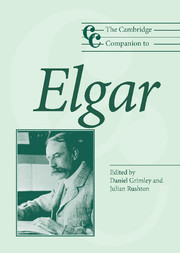Book contents
- Frontmatter
- 1 Introduction
- 2 Elgar and his British contemporaries
- 3 Elgar and his publishers
- 4 Magic by mosaic: some aspects of Elgar's compositional methods
- 5 Elgar's musical language: the shorter instrumental works
- 6 The early choral works
- 7 Elgar's later oratorios: Roman Catholicism, decadence and the Wagnerian dialectic of shame and grace
- 8 Roman Catholicism and being musically English: Elgar's church and organ music
- 9 ‘A smiling with a sigh’: the chamber music and works for strings
- 10 In search of the symphony: orchestral music to 1908
- 11 The later orchestral music (1910–34)
- 12 Elgar's unwumbling: the theatre music
- 13 Elgar and recording
- 14 Broadcasting's ally: Elgar and the BBC
- 15 Elgar in German criticism
- 16 Functional music: imperialism, the Great War, and Elgar as popular composer
- Notes
- Select bibliography
- Index
6 - The early choral works
Published online by Cambridge University Press: 28 September 2011
- Frontmatter
- 1 Introduction
- 2 Elgar and his British contemporaries
- 3 Elgar and his publishers
- 4 Magic by mosaic: some aspects of Elgar's compositional methods
- 5 Elgar's musical language: the shorter instrumental works
- 6 The early choral works
- 7 Elgar's later oratorios: Roman Catholicism, decadence and the Wagnerian dialectic of shame and grace
- 8 Roman Catholicism and being musically English: Elgar's church and organ music
- 9 ‘A smiling with a sigh’: the chamber music and works for strings
- 10 In search of the symphony: orchestral music to 1908
- 11 The later orchestral music (1910–34)
- 12 Elgar's unwumbling: the theatre music
- 13 Elgar and recording
- 14 Broadcasting's ally: Elgar and the BBC
- 15 Elgar in German criticism
- 16 Functional music: imperialism, the Great War, and Elgar as popular composer
- Notes
- Select bibliography
- Index
Summary
Hard to bear is the poignancy of loss induced by so many once living kinds of music separated by time and change, imprisoned in obsolete genres or superseded beliefs and practices. Manifestly important music, sometimes supremely great, is cut off from roots deep-nourished in a context of social, civic, or religious usage, to be preserved in artificial surroundings, most notably the technically flawless CD. Somewhere along this shadow-line of defunctive music lie the pre-Gerontius choral works with orchestra by Elgar. Aquick glance at the lists on the back of old Novello vocal scores of their hardcore staples (mainly Handel) suffices to reveal the extended wasteland, once teeming with life, of the Victorian oratorio. Elgar's compositional growth is firmly grounded in this copious provincial choral culture. His earlier cantatas make a determined bid to join it, his later to raise and enhance it; taken together they cover almost his entire composing life, which coincides with English choral culture at its apogee.
While the two last oratorios have never quite gained the safe mainstream, Gerontius is unbudgeable. And in more general terms his reputation has never stood higher in all the years since its first peak in the twentieth century's first decade. But the pre-Gerontius pieces, for the most part clear milestones on a great composer's path to prime-of-life powers, none utterly negligible, some patently inspired, are largely neglected. That they have all been recorded goes to endorse my opening remarks: this is exhumation, not living repertory, available anywhere but in the concert hall where it belongs.
- Type
- Chapter
- Information
- The Cambridge Companion to Elgar , pp. 63 - 80Publisher: Cambridge University PressPrint publication year: 2005



